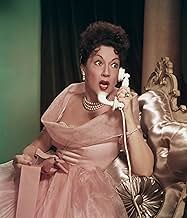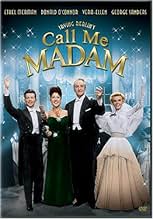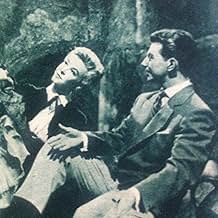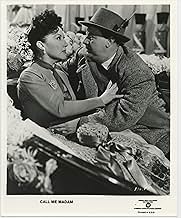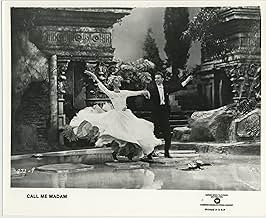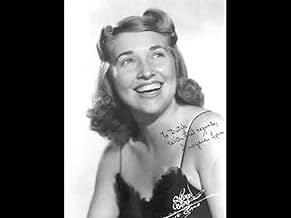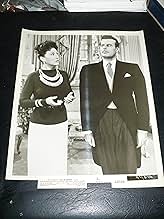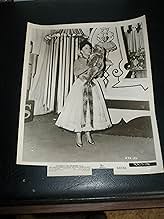IMDb RATING
6.7/10
1.5K
YOUR RATING
Washington hostess Sally Adams becomes a Truman-era US ambassador to a European grand duchy.Washington hostess Sally Adams becomes a Truman-era US ambassador to a European grand duchy.Washington hostess Sally Adams becomes a Truman-era US ambassador to a European grand duchy.
- Director
- Writers
- Stars
- Won 1 Oscar
- 3 wins & 4 nominations total
Ludwig Stössel
- Grand Duke Otto
- (as Ludwig Stossel)
David Ahdar
- Dancer
- (uncredited)
Elizabeth Allan
- Singing Telephone Operator
- (uncredited)
Leon Alton
- Minor Role
- (uncredited)
Leon Belasco
- Band Leader
- (uncredited)
- Director
- Writers
- All cast & crew
- Production, box office & more at IMDbPro
Featured reviews
Call Me Madam is an excellent film, that I don't think is as appreciated as much as it should be. One of the film's main merits is that it is beautifully designed, with stunning cinematography, and Ethel Merman's dresses especially were to die for. The only things that let it down that let it down were its length and that one or two scenes could have simplified. However, these are fully compensated by the marvellous Irving Berlin songs and the dazzling choreography, evident in Donald O'Connor and Vera Ellen's dance routines. Now for the performances-Ethel Merman lends her big brassy personality to the character of Mrs Adams and does a highly commendable job. Whether she gave the best performance of the film is up for debate, personally I think not, for Donald O'Connor is a sheer delight as her assistant, and Vera Ellen looked beautiful and danced a dream. Though special mention should go to George Sanders as Cosmo Costantine, who not only shone with his charm and charisma, but also his singing was absolutely beautiful. Overall, a very well done musical, where the performances, songs and choreography shine through considerably, and fully compensate for the film's minor flaws. 8/10 Bethany Cox
Movie audiences got a treat in Call Me Madam because they got to see Ethel Merman repeat one of two of her Broadway roles for the screen, the other being in the first Anything Goes.
For some reason, movie audiences never really took to Ethel. She did some parts during the Thirties, but in the Forties worked exclusively on Broadway. Mary Martin suffered a similar fate and we never got to see any of her Broadway starring roles with the exception of the famous telecast of Peter Pan.
Irving Berlin wrote the score for Call Me Madam and the book is based on the colorful life of Perle Mesta, famous Washington socialite who Harry Truman made ambassador to Luxembourg.
That's the way of things in Washington. Both parties with a new administration give ambassadorships out to wealthy contributors and Perle Mesta, an oil widow was one of the wealthiest.
Ethel is appointed by President Truman as Ambassador to the mythical duchy of Lichtenburg. Her rather informal style sets some professional State Department teeth rattling and during the course of the film both causes and solves a diplomatic crisis. Her personal assistant, Donald O'Connor is in her corner, but the chief of Protocol Billy DeWolfe is at his wit's end.
Both Ethel and Donald find romance in Lichtenburg, she with Count George Sanders and he with Vera-Ellen. When things aren't looking so good, they console each other with the hit song of Call Me Madam, You're Just In Love. This is what you call a contrapuntal melody with both members of the duet singing different melodies at the same time. At the same time this one was hitting the jukeboxes, another contrapuntal by Berlin, Play A Simple Melody was revived by Bing Crosby and his son Gary. To my knowledge no other major composer has ever had a hit with one of those.
George Sanders surprised quite a few folks with his singing voice. They needn't have been, he in fact had appeared in some musicals on the London stage before going into film. And he drops the sneer that usually accompanies most of us film characters and makes a most dashing and romantic count.
Dropped from the film version was Irving Berlin's tribute to Dwight D. Eisenhower which became his campaign theme song, I Like Ike. I guess it was considered redundant since the American people already had him. There are many references to Harry in the book and how Ethel was going to not let him down in the position he placed her in.
Billy DeWolfe steals every scene he's in as the fussy officious career foreign service employee, Pemberton Maxwell. If there ever was a name for a stuffy career WASP diplomat, that's it. They were a ripe target back then, certain politicians made a living on accusing a whole flock of them as traitors. One of them was Truman's Secretary of State, Dean Acheson. There manner didn't play well in what we would now call red state America.
Call Me Madam is bright and funny with a great score and some fabulous performances. Can't do better than that.
For some reason, movie audiences never really took to Ethel. She did some parts during the Thirties, but in the Forties worked exclusively on Broadway. Mary Martin suffered a similar fate and we never got to see any of her Broadway starring roles with the exception of the famous telecast of Peter Pan.
Irving Berlin wrote the score for Call Me Madam and the book is based on the colorful life of Perle Mesta, famous Washington socialite who Harry Truman made ambassador to Luxembourg.
That's the way of things in Washington. Both parties with a new administration give ambassadorships out to wealthy contributors and Perle Mesta, an oil widow was one of the wealthiest.
Ethel is appointed by President Truman as Ambassador to the mythical duchy of Lichtenburg. Her rather informal style sets some professional State Department teeth rattling and during the course of the film both causes and solves a diplomatic crisis. Her personal assistant, Donald O'Connor is in her corner, but the chief of Protocol Billy DeWolfe is at his wit's end.
Both Ethel and Donald find romance in Lichtenburg, she with Count George Sanders and he with Vera-Ellen. When things aren't looking so good, they console each other with the hit song of Call Me Madam, You're Just In Love. This is what you call a contrapuntal melody with both members of the duet singing different melodies at the same time. At the same time this one was hitting the jukeboxes, another contrapuntal by Berlin, Play A Simple Melody was revived by Bing Crosby and his son Gary. To my knowledge no other major composer has ever had a hit with one of those.
George Sanders surprised quite a few folks with his singing voice. They needn't have been, he in fact had appeared in some musicals on the London stage before going into film. And he drops the sneer that usually accompanies most of us film characters and makes a most dashing and romantic count.
Dropped from the film version was Irving Berlin's tribute to Dwight D. Eisenhower which became his campaign theme song, I Like Ike. I guess it was considered redundant since the American people already had him. There are many references to Harry in the book and how Ethel was going to not let him down in the position he placed her in.
Billy DeWolfe steals every scene he's in as the fussy officious career foreign service employee, Pemberton Maxwell. If there ever was a name for a stuffy career WASP diplomat, that's it. They were a ripe target back then, certain politicians made a living on accusing a whole flock of them as traitors. One of them was Truman's Secretary of State, Dean Acheson. There manner didn't play well in what we would now call red state America.
Call Me Madam is bright and funny with a great score and some fabulous performances. Can't do better than that.
10nmayers
Both Ethel Merman and Donald O'Connor suffered from the same misfortune -- lack of quality movie roles to showcase their extraordinary gifts. In O'Connor's case, it was because from childhood up into his middle twenties he was contracted by Universal Studios which, up 'til that time, produced "B" movies, suitable for coming into an air-cooled movie theater on a hot summer's day, but not much else. He always shone brightly, however, even in those early films, but not 'til Singin' In The Rain -- and Call Me Madam -- did he get the chance to glitter in great "A" material. Ethel Merman, the greatest of the Broadway greats had expansive mannerisms, stereophonic lungs, and irrepressable exhuberance, and was not considered cinema material by the powers that be. See how wrong the powers can be? O'Connor and Merman together in this film make it great -- his dancing, her voice, their personalities blending in just the right way. Great movie with two great leads -- don't miss "Call Me Madam"!
Thanks to the Fox Movie Channel one can rediscover forgotten things that don't show on television these days. It was a royal treat to have this film play the other night. We had seen the film years ago, but one forgets how much fun it was and how it still can delight anyone at all.
It helps a great deal this musical score was written by Irving Berlin, perhaps one of the most talented American composers of all times. The music of "Call Me Madam" can't be considered his best, but it pleases the viewer when it plays on the screen. The direction by Walter Lang also was an asset; even though it's filmed musical theater, it doesn't feel claustrophobic.
Ethel Merman was a magnificent star of the New York Broadway stage. She was a legend in the way she could sing a song and she could be heard in the whole theater; no mikes for Ms. Merman!. She was an original who was a consumed entertainer; she graced many musicals during her lifetime. It shows how foolish Hollywood was in not letting Ms. Merman repeat some of the same roles she created for the theater. It's sad, but it's a great loss.
Donald O'Connor does some of his best work in films in the movie. He plays well against Ms. Merman, as well as against Vera Ellen, his love interest in the film. Mr. O'Connor and Ms. Ellen are charming in their roles.
A great surprise was to see George Sanders, a man who played heavies, or cynical characters on the screen, singing and acting with enough suavity to charm Ms. Merman. Also in the cast, Walter Slezak, Billy DeWolfe, who are also effective in their supporting roles.
This is a film that will delight anyone looking for a pleasant time watching a delightful musical.
It helps a great deal this musical score was written by Irving Berlin, perhaps one of the most talented American composers of all times. The music of "Call Me Madam" can't be considered his best, but it pleases the viewer when it plays on the screen. The direction by Walter Lang also was an asset; even though it's filmed musical theater, it doesn't feel claustrophobic.
Ethel Merman was a magnificent star of the New York Broadway stage. She was a legend in the way she could sing a song and she could be heard in the whole theater; no mikes for Ms. Merman!. She was an original who was a consumed entertainer; she graced many musicals during her lifetime. It shows how foolish Hollywood was in not letting Ms. Merman repeat some of the same roles she created for the theater. It's sad, but it's a great loss.
Donald O'Connor does some of his best work in films in the movie. He plays well against Ms. Merman, as well as against Vera Ellen, his love interest in the film. Mr. O'Connor and Ms. Ellen are charming in their roles.
A great surprise was to see George Sanders, a man who played heavies, or cynical characters on the screen, singing and acting with enough suavity to charm Ms. Merman. Also in the cast, Walter Slezak, Billy DeWolfe, who are also effective in their supporting roles.
This is a film that will delight anyone looking for a pleasant time watching a delightful musical.
There's been a long wait to revisit the delights of this brassy film recreation of a big Broadway hit, but now we can once again enjoy it, fairly bursting from the screen, with its several lively production numbers, John DeCuir's classy production design, Irene Sharaff's flattering costumes, plus Robert Alton's absolutely first-rate choreography. Check out Vera-Ellen and an ultra-well-rehearsed chorus of dancers in "The Orcarina" number, as well as her amazing dance duets with Donald O'Connor, who smoothly displays his exceptional terpsichorean ability, so well showcased two years earlier in MGM's "Singin' in the Rain." George Sanders's singing is a wonderful surprise, holding his own with leather-lunged Madame Merman, who had triumphed on Broadway with this votive offering to her stardom, so cleverly crafted by Irving Berlin. Alfred Newman's Oscar for his endlessly inventive musical direction was more than well-deserved. For anyone who thinks that M-G-M was the only studio to adequately mount a film musical, this one might convince fans of this genre otherwise. (The DVD, by the way, is a very nice transfer, and boasts a quite informative commentary by "Musical Film Scholar" Miles Kreuger.)
Did you know
- TriviaThis is the only full film musical that George Sanders made, despite his appealing singing voice.
- Quotes
Cosmo Constantine: You are the most American American I have ever met.
Sally Adams: That's the nicest thing anyone's ever told me.
- Crazy creditsDuring the opening credits, as each word in the title appears onscreen, we hear, but do not see, Ethel Merman exclaiming, in a demanding tone of voice: "Call..me..madam!"
- ConnectionsFeatured in Fred Astaire Salutes the Fox Musicals (1974)
- SoundtracksOverture
Music and Lyrics by Irving Berlin
Performed by Ethel Merman and the 20th Century-Fox Studio Orchestra and Chorus
- How long is Call Me Madam?Powered by Alexa
Details
- Release date
- Country of origin
- Official sites
- Language
- Also known as
- Irving Berlin's Call Me Madam
- Filming locations
- Production company
- See more company credits at IMDbPro
- Runtime
- 1h 54m(114 min)
- Aspect ratio
- 1.37 : 1
Contribute to this page
Suggest an edit or add missing content


